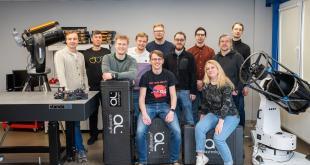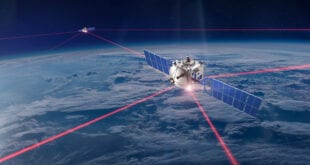
London, 30 June 2023.– Cailabs, a French deep-tech company which designs, manufactures and sells photonic solutions, and Astrolight, a Lithuanian company providing satellite-to-ground laser communication company, announced on the 28th of June that they have entered into an agreement to launch a satellite mission hosting Astrolight’s space-to-Earth laser communication terminal ATLAS-1.
The mutual objective of the mission is to establish laser communication downlinks and demonstrate pointing, acquisition and tracking capabilities at a gigabit per second data rates between ATLAS-1 – manufactured by Astrolight – and Cailab optical ground station (OGS).
“We look forward to demonstrating reliable and stable pointing, acquisition and tracking between ATLAS-1 and Cailabs OGS over as many passes as possible. This is a fundamental prerequisite for developing a commercial data downlink solution that will be useful to our customers,” said Laurynas Maciulis, co-founder and CEO of Astrolight. “Space-to-Earth optical communication is challenging and most of the missions so far have failed just in this first step.”
Cailabs is a manufacturer of turnkey and multimission-OGS. Having a space-to-earth laser communication terminal (LCT) for testing optical ground stations represents an additional means of validation for the company and its customers.
“We are delighted to be working with Astrolight on this ambitious project. Few players today offer high data rate laser communication terminals with a small SWaP (Size, Weight and Power) for nanosatellites. Cailabs is pleased to collaborate with an emerging European actor in this field,” said Pu Jian, Chief Product Officer & Deputy CEO at Cailabs.
This mission aims to increase the technology readiness level of both Astrolight and Cailabs systems and pave the way for further commercialisation of both products. ATLAS-1 is a demonstrator version of Astrolight’s ATLAS product line. Further versions of ATLAS are intended to achieve higher downlink speeds of over 10 Gbps. ATLAS design is optimised for Earth observation satellites with specific attention to small size and power consumption.





